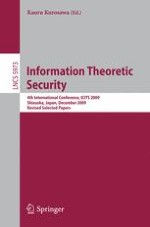2010 | OriginalPaper | Buchkapitel
Efficient Statistical Asynchronous Verifiable Secret Sharing with Optimal Resilience
verfasst von : Arpita Patra, Ashish Choudhary, C. Pandu Rangan
Erschienen in: Information Theoretic Security
Verlag: Springer Berlin Heidelberg
Aktivieren Sie unsere intelligente Suche, um passende Fachinhalte oder Patente zu finden.
Wählen Sie Textabschnitte aus um mit Künstlicher Intelligenz passenden Patente zu finden. powered by
Markieren Sie Textabschnitte, um KI-gestützt weitere passende Inhalte zu finden. powered by
We present a new statistical
asynchronous verifiable secret sharing
(AVSS) protocol with
optimal resilience
; i.e. with
n
= 3
t
+ 1, where
n
is the total number of participating parties and
t
is the maximum number of parties that can be under the control of a
computationally unbounded active adversary
${\mathcal A}_t$
. Our protocol privately communicates
${\mathcal O}((\ell n^3 + n^4 \kappa) \kappa)$
bits and
A-cast
s
${\mathcal O}(n^3 \log(n))$
bits to simultaneously share ℓ ≥ 1 elements from a finite field
${\mathbb F}$
, where
κ
is the error parameter.
There are only two known statistical AVSS protocols with
n
= 3
t
+ 1, reported in [11] and [26]. The AVSS protocol of [11] requires a private communication of
${\mathcal O}(n^9 \kappa^4)$
bits and
A-cast
of
${\mathcal O}(n^9 \kappa^2 \log(n))$
bits to share a
single
element from
${\mathbb F}$
. Thus our AVSS protocol shows a significant improvement in communication complexity over the AVSS of [11]. The AVSS protocol of [26] requires a private communication of
${\mathcal O}((\ell n^3 + n^4) \kappa)$
bits and
A-cast
of
${\mathcal O}((\ell n^3 + n^4) \kappa)$
bits to share ℓ ≥ 1 elements. However, the shared element(s) may be
$NULL \not \in {\mathbb F}$
. Thus our AVSS is better than the AVSS of [26] due to two reasons: (a) The
A-cast
communication of our AVSS is
independent
of the number of secrets i.e. ℓ; (b) Our AVSS makes sure that the shared value(s) always belong to
${\mathbb F}$
.
Using our AVSS, we design a new primitive called Asynchronous Complete Secret Sharing (ACSS) which is an essential building block of
asynchronous multiparty computation
(AMPC). Using our ACSS scheme, we can design a statistical AMPC with
optimal resilience
; i.e., with
n
= 3
t
+ 1, that privately communicates
${\mathcal O}(n^5 \kappa)$
bits
per multiplication gate
. This will significantly improve the only known statistical AMPC of [8] with
n
= 3
t
+ 1, which privately communicates Ω(
n
11
κ
4
) bits and
A-cast
Ω(
n
11
κ
2
log(
n
)) bits per multiplication gate.
